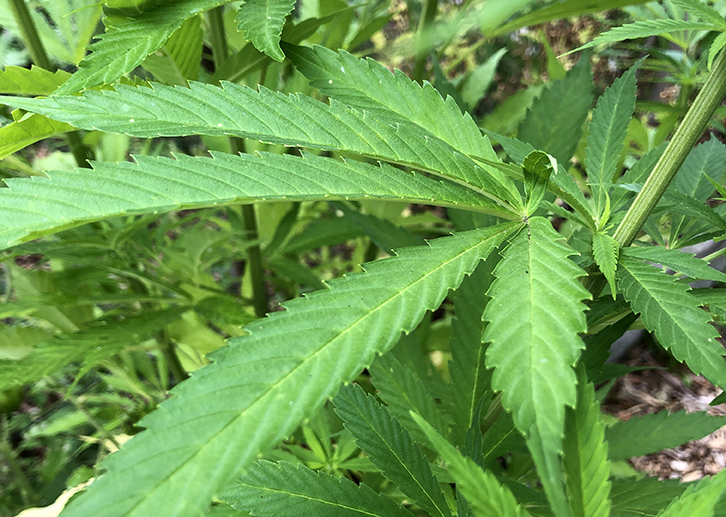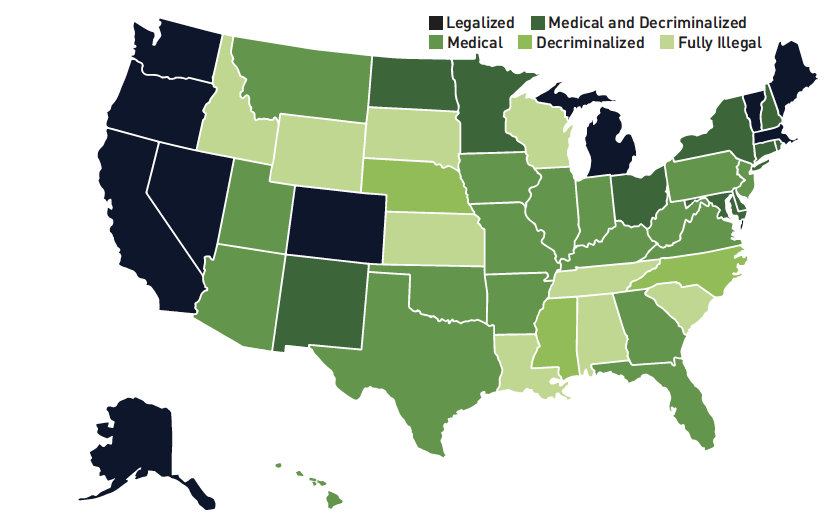By the time this State of the Industry section was published in Catersource magazine's last issue of 2019, the laws on the use of hemp, CBD (cannabidol), and THC (tetrahydrocannabinol)—in some capacity—changed.
By the time you have finished reading this section, chances are laws will have changed yet again.
“It’s like trying to mow the lawn at Augusta for the Masters tournament,” said Justin Prochnow, a Colorado lawyer with Greenberg Taurig in September 2019 at Food Immersion’s Hemp and Cannabis in Food conference. “By the time we get finished mowing the course [documenting the new cannabis laws], we have to start over again because it has grown while you were off doing the other parts!”
Let me repeat. By the time you read this…a lot may have changed.
As state-by-state acceptance of all components of the cannabis sativa plant roll across the U.S., we clearly cannot ignore the corollaries on the food, beverage, and event industries.

Photo courtesy Kathleen Stoehr
Bewildering possibilities
In its simplest definition, hemp is to nutrition what CBD is to physical and mental health, to what THC is for pleasure. But please—don’t quote me on it because only one of these products is sanctioned by clear consumption laws. That’d be hemp, which went from being a legal crop in the 18th and 19th centuries, to illegal in the 20th century, to legal yet again in the 21st via the Farm Bill (December 2018), which took the DEA out of the equation by redefining it as an industrial crop.
As for CBD, the TTB (Alcohol and Tobacco Tax and Trade Bureau) and FDA have both made it very clear that it is not a legal ingredient for use in food and beverage (at least of the writing of this article!); also, to make any sort of claim related to potential health benefits is also illegal.
I asked Prochnow directly: “How can that be? I’m in Denver and all I see are bars touting cocktails with CBD added; I’m eating ribs that are dressed with CBD-infused barbecue sauce; buying CBD-infused coffee beans.”
“Look at it this way,” he said. “Even if the speed limit is 40, people go 55 all of the time. There are a lot of people speeding and there are only so many cops with radar guns to pull them over. But if you do get pulled over, obviously it’s not an excuse that ‘everybody else is doing it!’ These proprietors are looking at risk tolerance and risk assessment.”
Peter Grinspoon, MD, of Harvard Health Publishing, agrees, stating in August 2019, “All 50 states have laws legalizing CBD with varying degrees of restriction, and while the federal government still considers CBD in the same class as marijuana, it doesn’t habitually enforce against it.”
Finally, there is THC, for which only 11 states have made it legal for consumption over the age of 21. Again…as of early December 2019.

Go to https://disa.com/map-of-marijuana-legality-by-state to find out the latest updates on your state.
Consumer confusion
Adding to the melee is marketing, swiping wildly at all of the billion-dollar possibilities this industry engenders. Carl’s Jr. offered its Rocky Mountain High burger on “weed day” (4/20) with CBD infused into the sauce; but will the consumer get “a Rocky Mountain high?” No.
Puns abound, “let’s be blunt” and “half baked”—and yet the products with only CBD or hemp have no capacity to get anyone stoned.
Finally…your catered event
Headline: October 31, 2019, via The Fresh Toast: Binge Drinking Plummeting in States with Legal Marijuana
Headline: November 10, 2019, via The Boston Globe: Starting Your Marriage on a High Note: How to add marijuana to your wedding day
Book available now via Ten Speed Press (March 2019): Higher Etiquette: A Guide to the World of Cannabis, from Dispensaries to Dinner Parties, by Lizzie Post
With nearly two out of three Americans supporting the legalization of cannabis in all forms, where does this leave your company when it becomes legal in your state? Comments from catering and event companies range from adhering to their current 100% smoking or vaping-free establishments, to looking the other way when a guest lights up, to rejoicing that having guests “chill and hungry” versus “belligerent and drunk” is not at all a bad thing.
“We still aren’t 100 percent on board yet,” said Ken Barrett-Sweet of Boston’s A Catered Affair. “Neither is our insurance company!” But, Barrett-Sweet says, “if you allow ‘granny’s cookies’ brought into your event, for example, how will you know they don’t contain weed?”
The Herbal Chef, Chris Sayegh, who presented a coursed dosing session at Catersource in 2018, has been holding private multiple-course dinner parties for years that range upwards of $500 per person. “I don’t recommend it [cannabis] in things that are shared, because then there is no way to make sure that everyone [is dosed properly],” said Sayegh via Global News. “I always do plated courses because we can control the amount of dosage. Cannabis is not all about getting high. There are multi-facets to this plant … it is incredible what it can do.”
Here is another word that will come into play over the next few years: terpenes, which are the flavors and aromas that are found in the plant’s terroir. Think about how basil can have different aromas and flavors from Thai to Italian and you are on the right track. This pairing of varied terpenes with meals will become as important as sommeliers are to wine, and cicerones are to beer. A cannabis sommelier? It’s not that far off. Indeed, Colorado’s Trichome Institute teaches “interpening,” (interpreting terpenes) which, says Trichome’s president Max Montrose, is important because, “as much as we want to empower the normalization and education of cannabis, there is zero standardization to the level of knowledge, experience, or safety certifications an event host should have.”
Beyond that, the de-stigmatization of cannabis continues. If you are in a state that allows it fully, learn as much as you are able and make a decision about whether you want to dive into this new market, in order to be best informed for the next client who asks, “Can I have weed with that?”
Learn more at Catersource 2020
Catersource education will offer two sessions are specifically centered around cannabis:
Session 1: Infused Cooking with Master Chef Season 7 winner Chef Shaun O’Neale, 10:45 to 11:45, Tuesday, March 10 on the Culinary Experience stage
Session 2: It's High Times! Tracking Consumer Data Behind Hemp, CBD, and THC with Datassential’s Kelley Fechner, 3:15 to 4:00, Tuesday, March 12




